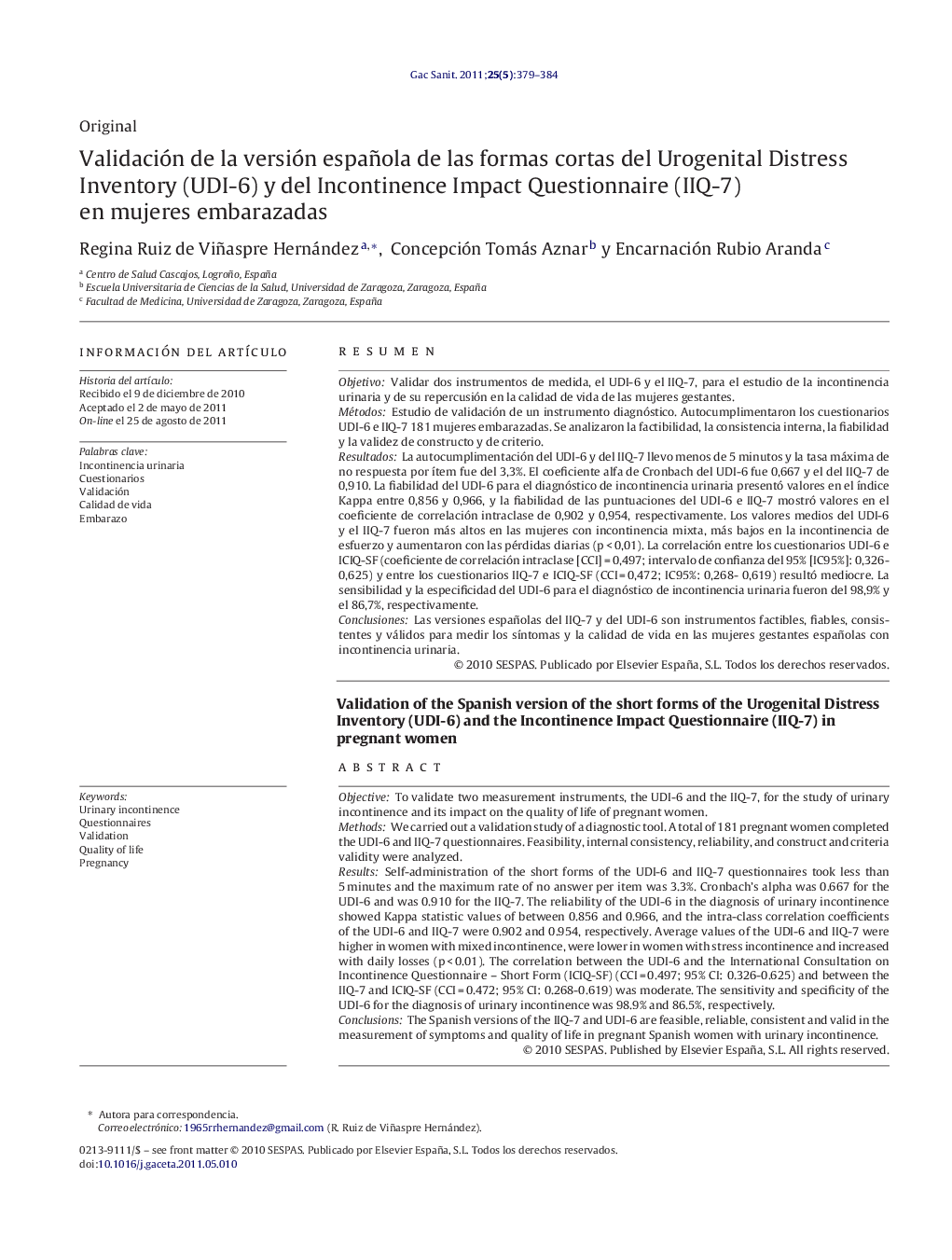| Article ID | Journal | Published Year | Pages | File Type |
|---|---|---|---|---|
| 1073932 | Gaceta Sanitaria | 2011 | 6 Pages |
ResumenObjetivoValidar dos instrumentos de medida, el UDI-6 y el IIQ-7, para el estudio de la incontinencia urinaria y de su repercusión en la calidad de vida de las mujeres gestantes.MétodosEstudio de validación de un instrumento diagnóstico. Autocumplimentaron los cuestionarios UDI-6 e IIQ-7 181 mujeres embarazadas. Se analizaron la factibilidad, la consistencia interna, la fiabilidad y la validez de constructo y de criterio.ResultadosLa autocumplimentación del UDI-6 y del IIQ-7 llevo menos de 5 minutos y la tasa máxima de no respuesta por ítem fue del 3,3%. El coeficiente alfa de Cronbach del UDI-6 fue 0,667 y el del IIQ-7 de 0,910. La fiabilidad del UDI-6 para el diagnóstico de incontinencia urinaria presentó valores en el índice Kappa entre 0,856 y 0,966, y la fiabilidad de las puntuaciones del UDI-6 e IIQ-7 mostró valores en el de correlación intraclase de 0,902 y 0,954, respectivamente. Los valores medios del UDI-6 y el IIQ-7 fueron más altos en las mujeres con incontinencia mixta, más bajos en la incontinencia de esfuerzo y aumentaron con las pérdidas diarias (p < 0,01). La correlación entre los cuestionarios UDI-6 e ICIQ-SF (coeficiente de correlación intraclase [CCI] = 0,497; intervalo de confianza del 95% [IC95%]: 0,326-0,625) y entre los cuestionarios IIQ-7 e ICIQ-SF (CCI = 0,472; IC95%: 0,268- 0,619) resultó mediocre. La sensibilidad y la especificidad del UDI-6 para el diagnóstico de incontinencia urinaria fueron del 98,9% y el 86,7%, respectivamente.ConclusionesLas versiones españolas del IIQ-7 y del UDI-6 son instrumentos factibles, fiables, consistentes y válidos para medir los síntomas y la calidad de vida en las mujeres gestantes españolas con incontinencia urinaria.
ObjectiveTo validate two measurement instruments, the UDI-6 and the IIQ-7, for the study of urinary incontinence and its impact on the quality of life of pregnant women.MethodsWe carried out a validation study of a diagnostic tool. A total of 181 pregnant women completed the UDI-6 and IIQ-7 questionnaires. Feasibility, internal consistency, reliability, and construct and criteria validity were analyzed.ResultsSelf-administration of the short forms of the UDI-6 and IIQ-7 questionnaires took less than 5 minutes and the maximum rate of no answer per item was 3.3%. Cronbach's alpha was 0.667 for the UDI-6 and was 0.910 for the IIQ-7. The reliability of the UDI-6 in the diagnosis of urinary incontinence showed Kappa statistic values of between 0.856 and 0.966, and the intra-class correlation coefficients of the UDI-6 and IIQ-7 were 0.902 and 0.954, respectively. Average values of the UDI-6 and IIQ-7 were higher in women with mixed incontinence, were lower in women with stress incontinence and increased with daily losses (p < 0.01). The correlation between the UDI-6 and the International Consultation on Incontinence Questionnaire – Short Form (ICIQ-SF) (CCI = 0.497; 95% CI: 0.326-0.625) and between the IIQ-7 and ICIQ-SF (CCI = 0.472; 95% CI: 0.268-0.619) was moderate. The sensitivity and specificity of the UDI-6 for the diagnosis of urinary incontinence was 98.9% and 86.5%, respectively.ConclusionsThe Spanish versions of the IIQ-7 and UDI-6 are feasible, reliable, consistent and valid in the measurement of symptoms and quality of life in pregnant Spanish women with urinary incontinence.
